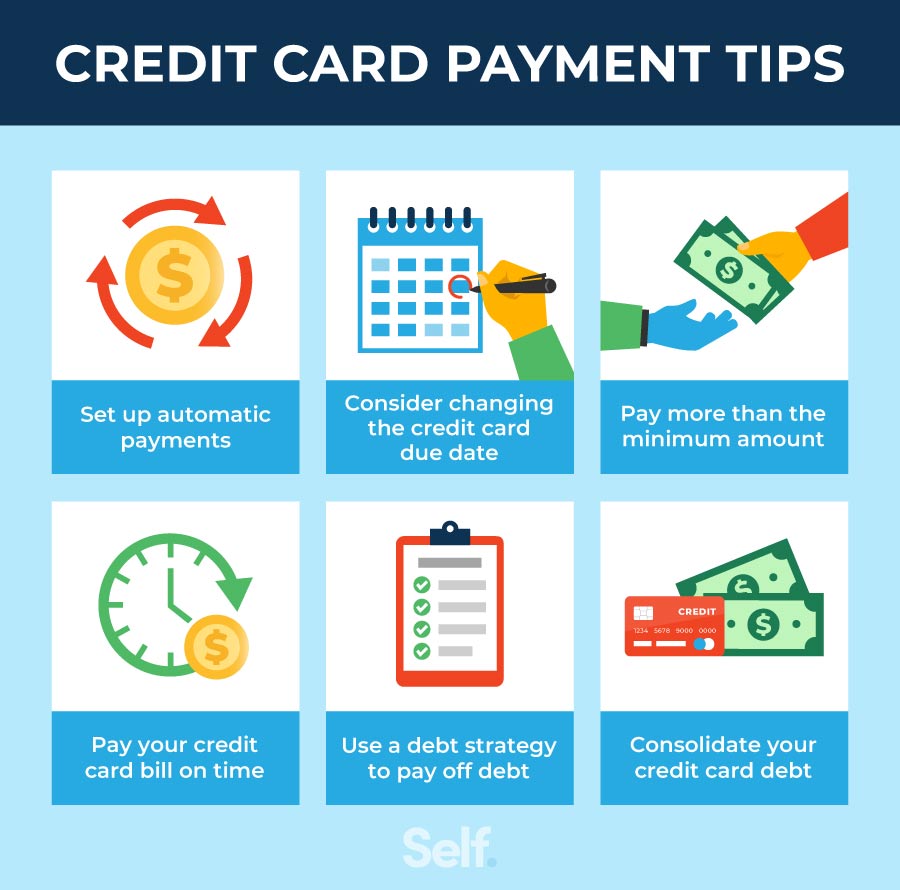Paying your credit card bill on time each month is crucial for avoiding late fees, interest charges, and damage to your credit score. But with so many payment options available how exactly should you go about paying your bill?
In this comprehensive guide, we’ll walk through the step-by-step process for paying your credit card bill, from deciding when and how much to pay to choosing a payment method. We’ll also provide tips to help you easily stay on top of payments going forward.
When Should You Pay Your Credit Card Bill?
When is the due date for your credit card bill? You can pay it on time, early, or even after the due date. Here’s an overview of the pros and cons of each approach:
-
Paying on the due date – This ensures your payment is received on time and prevents late fees and penalties. However, there is less wiggle room in case there are processing delays with your bank or credit card company.
-
Paying before the due date—Paying early gives you time in case there are processing delays. It can also temporarily lower the amount of credit you’re using, which is good for your credit score. You’ll still have a balance, though, if you don’t pay off purchases made after the statement close date.
-
You shouldn’t pay after the due date; even one day late can lead to late fees, higher APRs, and damage to your credit score. Getting caught up as soon as possible is important if you pay after the due date.
Most experts recommend paying at least 3-5 days before the due date as a balance between ensuring on-time delivery while still carrying over some balance to the next month. Paying too far in advance can leave you short on cash later in the billing cycle.
How Much Should You Pay on Your Credit Card Bill?
You’ll typically have several payment amount options each month:
-
Minimum Payment: This is the smallest amount you can pay to keep your account in good standing. However, it will take a very long time to pay off your balance only making minimum payments, accruing substantial interest charges along the way.
-
Statement Balance: This is the full balance owed at the end of your most recent billing statement. Paying this amount in full helps avoid interest charges.
-
Current Balance: This reflects your most updated balance, including purchases made after the statement closing date. You can pay the current balance if you want to pay off newer purchases right away too.
To save the most and pay off your balance quickly, we recommend paying your statement balance in full each month if you can. If you can’t pay in full, paying more than the minimum required is the next best option for reducing interest fees over time.
Prioritize paying off cards with the highest interest rates first when tackling credit card debt. Make sure to budget accordingly so you can afford your monthly payments.
How to Submit Your Credit Card Payment
You’ll have several options for actually making your credit card payment each month, including:
-
Pay Online – Most credit card companies allow online payments through their website or mobile app. You can log in to your account, enter payment details securely, and receive instant confirmation of your payment.
-
Pay by Phone – Look on your statement for the customer service phone number and call to make a payment. You’ll provide your card details and payment amount over the automated system or to a customer service rep.
-
Pay by Mail – Detach the payment stub from your statement and mail it with a check or money order to the payment address printed on the statement. Be sure to mail at least 7-10 days before the due date in case of mail delays.
-
Automatic Payments – You can set up recurring monthly payments directly from your checking account around each due date. Log in and enable autopay through your card issuer’s website. Just ensure funds are available to avoid overdraft fees.
-
Pay in Person – Some card issuers have physical branch locations where you can visit and make a cash payment in person. Call ahead to confirm payment policies and hours.
We recommend paying online or setting up automatic payments for convenience, security, and ensuring on-time delivery each month.
5 Tips for Staying Organized with Credit Card Payments
Managing multiple credit card accounts and payments can quickly become disorganized. Here are some tips to make the payment process easier each month:
-
Note all due dates – Mark your calendar with each card’s payment due date so you remember when payments are coming up.
-
Sign up for alerts – Many card issuers will email or text alerts before due dates and for other account notifications. These can serve as helpful reminders.
-
Automate payments – Setting up autopay takes the hassle out of manually making payments every month. Just verify funds are available by each due date.
-
Pay weekly or bi-weekly – Making smaller, more frequent payments helps you avoid large lump sum payments each month.
-
Pay highest interest balances first – If carrying a balance month-to-month, target extra payments towards the card with the highest interest rate first to save on fees.
Common Questions about Credit Card Payments
If you’re new to credit card payments, here are answers to some frequently asked questions:
How long do I have to pay my credit card bill?
You typically have at least 21 days from the statement closing date to make your payment before the due date. Paying 25-30 days from the statement closing date can provide a nice buffer.
Where do I mail my credit card payment?
Check your statement – the payment mailing address and customer service phone number will be printed there.
Can I pay my credit card bill with a debit card?
Usually yes – most issuers allow debit card payments for convenience. It still draws right from your checking account.
What happens if I pay late?
Late payments typically trigger late fees around $30, penalty interest rates, and severe credit score damage that can take time to rebuild. Get caught up ASAP.
Can I set up multiple credit card accounts to pay from one bank account?
Absolutely. Services like PayPal allow you to store details for multiple credit cards and pull from the same bank account or PayPal balance automatically each month.
Paying Your Credit Card Bill with Ease
Now you have an overview of the entire credit card payment process – from deciding when and how much to pay to submitting your payment and staying organized every month.
Implementing these tips can help ensure on-time worry-free payments, avoiding fees and credit score impacts. Paying your credit card bill doesn’t have to be a chore each month. With the right system, you can easily set payments on autopilot and maintain healthy credit card habits for years to come.
Determine how much you’ll pay
The amount you pay will determine the cost of your balance now and in the future, as interest will accrue for a balance thats not paid off in full.
The typical payment options will include the following:
- Minimum payment due. Making the minimum payment will keep your account in good standing and prevent you from racking up late fees; but paying only the minimum is costly over time and will prolong your debt. Typically, youll be able to see how long it would take to pay off your balance with only minimum payments by reading the minimum payment warning on your credit card statement. In general, to save on interest charges, youll want to pay more than the minimum whenever possible.
- Statement balance. The statement balance is the sum of all transactions made during your credit cards billing period. Ideally, you want to focus on paying this amount in full because it could help you avoid interest charges.
- Current balance. If youve continued to make purchases since the statement closing date (which is noted on your statement, but is different from your due date), your current balance will include those additional charges — but you dont have to pay those newer charges until the next billing period. However, if you want to get ahead by making those payments now, youre welcome to do that.
To determine the best payment option for you, create a budget for your credit card purchases and other expenses. Youll want to include in that budget any debt and active promotional offers, including corresponding deadlines.
You typically won’t be charged interest on purchases until after your payment due date (this is called a credit card grace period), so if you pay your statement balance in full by the due date every month, you won’t have to worry about racking up interest charges.

Decide when to pay your credit card bill
You can pay your credit card bill precisely on the due date, or you can pay it early. Either way, youll avoid any potential penalty APRs, as well as costly late fees that can run as high as $41.
Paying early might temporarily help your credit utilization — a key factor that impacts credit scores — but it depends on your credit card statements closing date. Thats when your credit card issuer adds up your account activity from the previous billing period and creates your credit card statement. On or around the closing date is also when the issuer usually reports your card balance to the credit bureaus, which compile the reports that form the basis of your credit scores. If at that time your balance is low compared to your available credit line, then you have a low credit utilization ratio, which is beneficial for your scores.
This kind of payment timing might be a strategy to employ if youre soon applying for a loan or mortgage and want to increase your odds of approval.
Note that many issuers will allow you to change your payment due date to a day that better aligns with your budget or payday.
If you have any active promotional offers or your credit card earns rewards, paying on time will keep the offers current. Skipping payments could cause you to lose these incentives, depending on the credit cards terms and conditions.

